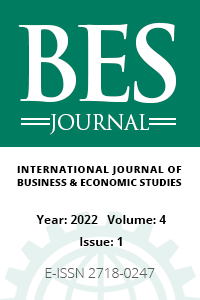The Importance of Emotional Intelligence in Interpersonal Relationships: A Study on Pilots in the Context of Daniel Goleman’s Emotional Intelligence Model
The Importance of Emotional Intelligence in Interpersonal Relationships: A Study on Pilots in the Context of Daniel Goleman’s Emotional Intelligence Model
The purpose of the current study is to test the relationship between the emotional intelligence levels of pilots and the dimensions of interpersonal relationships. The research consists of three parts. In the first part, the concept of interpersonal communication, in the second part, the concept of emotional intelligence, in the third part, the identification, evaluation, use and regulation of one’s own and others’ emotions and how interpersonal relationship dimensions change according to demographic factors are discussed. In this study, a survey was conducted on pilots. The analysis of the data was conducted with the SPSS 21.0 (Statistical Package for Social Sciences) program package. After a comprehensive literature review, it was tried to determine the scales that could measure the variables used in the best way and it was decided to use the scales whose validity and reliability were tested with different studies in the international literature. In addition, 7 questions were developed to determine the demographic characteristics of the pilots. The research model used is the descriptive research model because it was aimed to reveal the current situation in detail. When the analysis results were examined, it was understood that there was a significant relationship between the emotional intelligence levels of the pilots and the dimensions of interpersonal relations.
___
- Bradberry, T., & Greaves, J. 2017. Duygusal Zekâ 2.0. (A. Ulaş, Çev.) İstanbul: Sola Yayınları.
- Caruso, D. R., & Salovey, P. 2007. Yönetimde Duygusal Zekâ. (S. Kaymak, Çev.) İstanbul: Crea Yayıncılık.
- Ergin EF (2000). Üniversite öğrencilerinin sahip oldukları duygusal zeka düzeyi ile 16 kişilik özelliliği arasındaki ilişki üzerine bir araştırma. Çocuk Gelişimi ve Eğitimi Bilim Dalı Yüksek Lisans Tezi, Selçuk Üniv. Sosyal Bil. Enst. Konya.
- George, D., and Mallery, M., (2010). SPSS for Windows Step by Step: A Simple Guide and Reference. Boston
- Goleman, D. 2003. Duygusal Zekâ. (B. S. Yüksel, Çev.) İstanbul: Varlık Yayınları.
- İmamoğlu, E.-S. & Aydın, B. (2009). Kişilerarası ilişki boyutları ölçeğinin geliştirilmesi. Psikoloji Çalışmaları Dergisi, Cilt 29, Sayı 29, 39-64.
- Odabaşı, B. 2013. İlköğretim 2. Kademe Öğrencilerinin Duygusal Zekâ Düzeylerinin Ana – Baba Tutumları Açısından İncelenmesi. Anadolu Journal of Educational Sciences International 3(2).
- Tabachnick, B.G., Fidell, L.S. (2013). Using Multivariate Statistics. Boston: Pearson.
- Tarhan, N. 2017. Duyguların Psikolojisi ve Duygusal Zekâ. İstanbul: Timaş Yayınları.
- Turgut, G. 2014. Algılanan Sosyal Destek Ve Duygusal Zekâ Düzeyinin İş Tatminine Etkisinin Devlette Çalışan Üç Farklı Meslek Grubunda Karşılaştırılması: Mühendis, Doktor Ve Öğretmen. Maltepe Üniversitesi Sosyal Bilimler Enstitüsü Psikoloji Anabilim Dalı, Yayınlanmamış Yüksek Lisans Tezi.
- Yan, İ. 2008. Duygu- Zekâ İlişkisi ve Duygusal Zekânın Yöneticiler Üzerindeki Etkilerine Yönelik Bir Araştırma. Afyon: Afyon Kocatepe Üniversitesi Sosyal Bilimler Enstitüsü.
- ISSN: 2718-0247
- Yayın Aralığı: Yılda 2 Sayı
- Yayıncı: Mesut DOĞAN
